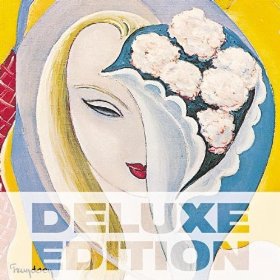Derek & the Dominos: Layla and Other Assorted Love Songs (Deluxe Edition)
 Derek & the Dominos
Derek & the Dominos
Layla and Other Assorted Love Songs (Deluxe Edition)
(Polydor)
As far as 60’s supergroups went, Derek and the Dominos was an odd case: Eric Clapton, Duane Allman and Co. made the best case for the use of the term, but also left too much promise unfulfilled. This was due in large part to Allman’s untimely departure from this earth, which was a loss not just to his bands, but to music in general. As it stands, Layla and Other Assorted Love Songs is a masterpiece for this reason alone, showing countless other bands exactly what a twin guitar line-up should sound like, and how country-blues could be effectively appropriated within an arena rock context. This success wasn’t just because of Clapton and Allman’s interplay, but also because they had one of the tightest and most undersung rhythm sections in rock: Carl Radle, Bobby Whitlock and Jim Gordon, who were swiped from Delaney and Bonnie’s band. The bona fide grit that they brought was the perfect grounding for the guitarists’ soaring leads.
“Layla” alone would make the case for it as one of the most essential records of the early 70’s, but “Bell Bottom Blues,†“I Looked Away,†“Tell The Truth,†and the near-perfect cover of “Little Wing†don’t hurt either. Still, the album doesn’t quite hold up to Wheels of Fire or Eat A Peach, summits that both guitarists, respectively, would try hard to reach again. The second disc of this 40th anniversary reissue includes tunes from a second, unreleased Derek and the Dominos record, begun after Allman’s death; uninspired playing and lackluster song choice bog down some otherwise great playing from the live sides included. Derek and the Dominos Live shows the band in fine form with Clapton able to command 15-minute jams that have no small dose of funk in them too. It also features four tracks taken from the band’s appearance on The Johnny Cash Show, which are similar to the Live songs, if a little more tame because of the studio setting.
Still, the highlight is Clapton’s trio with Cash and Carl Perkins on the latter’s “Matchbox.” While Clapton was open about his indebtedness to Albert and Freddie King, to hear him next to Perkins shows a vocal and instrumental inspiration that pervaded all of his solo work. Speaking of giants, another treat is the inclusion of the quickly-withdrawn first single, produced by Phil Spector, who the band rightly judged to be giving them too clean of a sound for what they were going for.
While the Allman Brothers went on to find a way to exist past the loss of their most unique member, Eric Clapton sank into depression, stealing George Harrison’s wife and becoming dangerously addicted to heroin. His solo career certainly didn’t suffer commercially, but it did quite a bit musically. Layla is the last point at which Clapton truly had the God-like magic his most ardent fans ascribed to him, and this deluxe edition presents a unique point of transition that he glossed up (and over) with a slick and uninspired 70’s canon.


